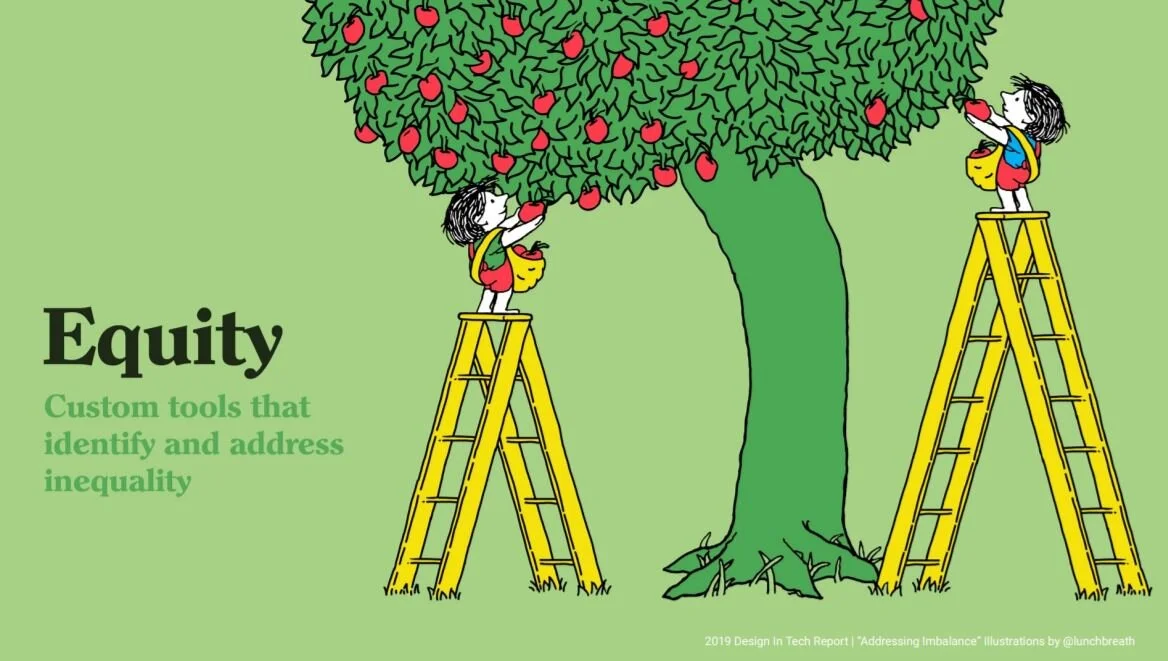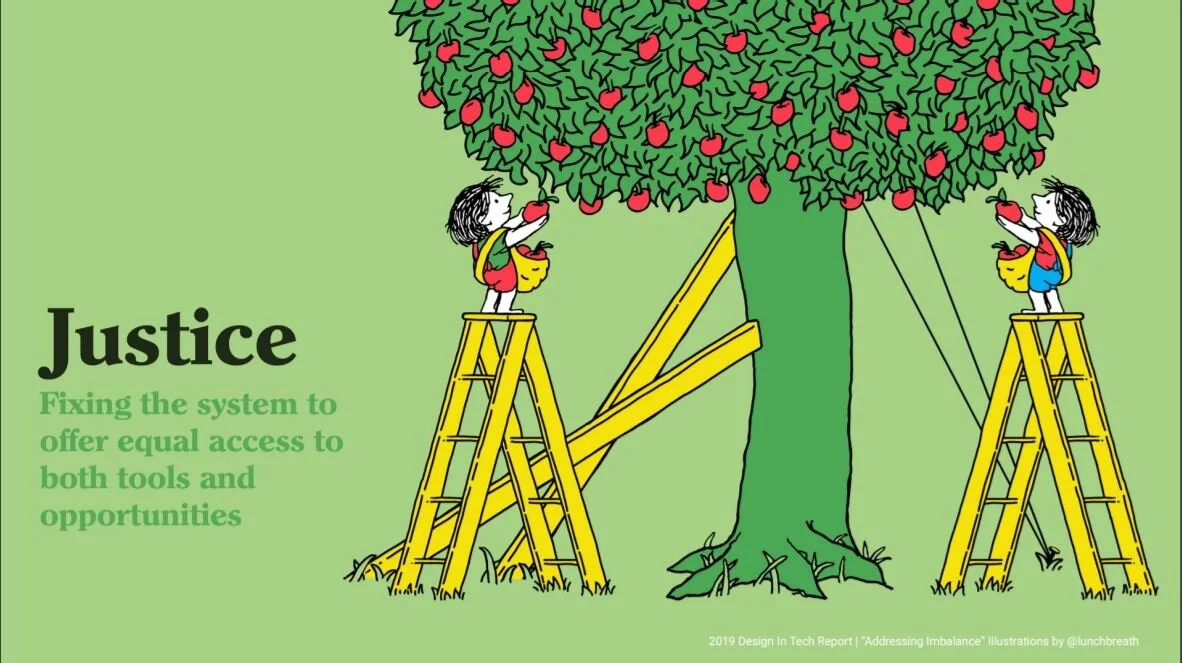
How we speak makes a difference
Equity, Diversity, Inclusion, Equality, Justice. Terms that get tossed around conference rooms and websites. What do they mean? How can we be intentional in how we speak with one another?

Credit: John Madea (Design in Tech 2019)



Agreements for A Conversation Space
These concepts and ideas are modified from and very thoroughly covered in Jory C. Lerback’s ‘Talking about Race in Earth and Space Science’ guide.
We are here to learn.
We don’t know everything about science, and we don’t know everything about these topics either. In fact, it is totally unreasonable for any one person to know ‘everything’ about anything! That is why we are here together. Treat yourself and others in this space with the understanding that new material can be frustrating or uncomfortable.
Share Speaking Space.
Think about why you are speaking (or why you are not!). Recognize that identity groups can play a big role in conversation dynamics—groups with some privilege often speak more than marginalized group members, without even realizing it. Share the air space.
Stay Accountable.
Everyone should be accountable to call out when something is hurtful, keeping in mind that intent does not always equal impact. Remain open to explaining why you found a word or phrase harmful, and also remain open to being held accountable for your own language. Recognize that it is not a personal insult to be held accountable.
(Some) Definitions
This resource was adapted from existing resources provided by the National Multicultural Institute, National Association for Multicultural Education, Institute for Democratic Renewal and Project Change, and the National Conference for Community and Justice.
A
Ableism - Discrimination against persons with mental and/or physical disabilities and/or social structures that favor able‐bodied individuals.
Ability - power or capacity to do or act physically, mentally, legally, morally, financially, etc.
Access - creating the necessary conditions so that individuals and organizations desiring to, and who are eligible to, use our services, facilities, programs and employment opportunities.
Acculturation - The process of learning and incorporating the language, values, beliefs, and behaviors that make up a distinct culture. This concept is not to be confused with assimilation, where an individual, family, or group may give up certain aspects of its culture in order to adapt to that of their new host country.
Achievement Gap - A term used to describe a persistent trend in the U.S. educational system in which white students achieve greater academic success than students of color. This term can also refer to the gap between girls’ and boys’ academic achievement.
Ally - a person of one social identity group who stands up in support of members of another group; typically member of dominant identity advocating and supporting a marginalized group.
Asexual - person who is not sexually attracted to anyone or does not have a sexual orientation. They may or may not experience romantic attraction.
B
Bias - a positive or negative inclination towards a person, group, or community; can lead to stereotyping.
Bisexual - The term “bisexual” is most often used to describe a person whose sexual orientation is to persons of either sex.
C
Cisgender - a gender identity where an individual’s self-perception of their gender aligns with their perceived sex.
Colorblind - Term used to describe personal, group, and institutional policies or practices that do not consider race or ethnicity as a determining factor. The term “colorblind” de‐ emphasizes, or ignores, race and ethnicity, a large part of one’s identity.
Cultural Competence - “A process of learning that leads to an ability to effectively respond to the challenges and opportunities posed by the presence of social cultural diversity in a defined social system.”
D
Disability - a physical, mental or cognitive impairment or condition that requires special accommodations to ensure programmatic and physical access.
Diversity - psychological, physical, and social differences that occur among any and all individuals; including but not limited to race, color, ethnicity, nationality, religion, socioeconomic status, veteran status, education, marital status, language, age, gender, gender expression, gender identity, sexual orientation, mental or physical ability, genetic information and learning styles. A diverse group, community, or organization is one in which a variety of social and cultural characteristics exist.
E
Ethnicity - a social construct which divides people into smaller social groups based on characteristics such as values, behavioral patterns, language, political and economic interests, history, and ancestral geographical base.
Equality - evenly distributed access to resources and opportunity necessary for a safe and healthy life; uniform distribution of access that may or may not result in equitable outcomes.
Equity - is the guarantee of fair treatment, access, opportunity, and advancement for all students, faculty, and staff, while at the same time striving to identify and eliminate barriers that have prevented the full participation of some groups. The principle of equity acknowledges that there are historically underserved and underrepresented populations and that fairness regarding these unbalanced conditions is needed to assist equality in the provision of effective opportunities to all groups.
F
Feminism - Theory and practice that advocates for educational and occupational equity between men and women and undermines traditional cultural practices that support the subjugation of women by men and the devaluation of women’s contributions to society.
G
Gay - A common and acceptable word for male homosexuals, but used for both genders.
Gender - the socially constructed ideas about behavior, actions, and roles a particular sex performs.
Gender Identity - a personal conception of one’s own gender; often in relation to a gender opposition between masculinity and femininity. It is how people externally communicate or perform their gender identity to others.
Gender Expression - an individual’s outward and external gendered appearance. This may include hair styles, clothes, accessories, and mannerisms. Gender expression may also include gender roles which are also defined by an individual’s culture/society.
I
Inclusion - the act of creating involvement, environments and empowerment in which any individual or group can be and feel welcomed, respected, supported, and valued to fully participate. An inclusive and welcoming climate with equal access to opportunities and resources embrace differences and offers respect in words and actions for all people.
Inclusive Language - Words or phrases that include both women and men if applicable. Inclusive language does not assume or connote the absence of women. Ex: Use of word “humankind” instead of “mankind.”
Individual Racism - the beliefs, attitudes, and actions of individuals that support or perpetuate racism; can occur at both a conscious and unconscious level, and can be active or passive. Examples include telling a racist joke, using a racial epithet, or believing in the inherent superiority of Whites.
Institutional Racism - refers specifically to the ways in which institutional policies and practices create different outcomes for different racial groups. The institutional policies may never mention any racial group, but their effect is to create advantages for Whites and oppression and disadvantage for people from groups classified as People of Color.
Intent vs. Impact - this distinction is an integral part of inclusive environments; intent is what a person meant to do and impact is the effect it had on someone else. Regardless of intent, it is imperative to recognize how behaviors, language, actions, etc. affect or influence other people. An examination of what was said or done and how it was received is the focus, not necessarily what was intended.
Intersectionality - the ways in which oppressive institutions (racism, sexism, homophobia, transphobia, ableism, xenophobia, classism, etc.) are interconnected and cannot be examined separately from one another.
Intercultural competence - is the ability to develop targeted knowledge, skills and attitudes that lead to visible behavior and communication that are both effective and appropriate in intercultural interactions.
L
LGBTQAAI - The acronym that means Lesbian, Gay, Bisexual and Transgender. The addition of a “Q” at the end often means “questioning” or “queer.” One “A” stands for “asexual”, another for “allies”. The “I” means “intersex”.
M
Marginalization - Treatment of a person, group or concept as insignificant or pervasive and places them outside of the mainstream society.
Micro aggressions - intentional or unintentional verbal, nonverbal or environmental slights/insults that communicate hostile, derogatory or negative messages to people based upon their marginalized group.
Multiculturalism - the practice of acknowledging and respecting the various cultures, religions, languages, social equity, races, ethnicities, attitudes, and opinions within an environment. The theory and practice promotes peaceful coexistence of all identities and people.
P
Prejudice - a pre-judgment or unjustifiable, and usually negative, attitude of one type of individual or groups toward another group and its members. Such negative attitudes are typically based on unsupported generalizations (or stereotypes) that deny the right of individual members of certain groups to be recognized and treated as individuals with individual characteristics.
Privilege - power and advantages benefiting a group derived from the historical oppression and exploitation of other groups
R
Race - a social construct that artificially divides people into distinct groups based on characteristics such as physical appearance, ancestral heritage, cultural affiliation, cultural history, ethnic classification, and the political needs of a society at a given period of time.
Respect - a feeling or understanding that someone or something is important, valued and should be treated in a dignified way
S
Safe Space - a space in which an individual or group may remain free of blame, ridicule and persecution, and are in no danger of coming to mental or physical harm.
Sexual Orientation - the direction of one’s sexual attraction toward the same gender, opposite gender, or other genders. It is on a continuum and not necessarily a set of absolute categories.
Social Construct - An idea that appears to be natural and obvious to people who accept it but may or may not represent reality
Social Justice - to take action as an advocate for a just society where all people have a right to fair and equitable treatment, support and resources
T
Tokenism - The policy of making only a perfunctory effort or symbolic gesture toward the accomplishment of a goal, such as racial integration; the practice of hiring or appointing a token number of people from underrepresented groups in order to deflect criticism or comply with affirmative action rules.
Transgender - This term is often used to describe persons whose gender identity “differs from conventional expectations for their physical sex.” “Transgender” is a term that can be used to refer to “transsexuals, masculine women, feminine men, drag queens/kings, cross‐ dressers, butches, etc.” Transgender persons can be heterosexual, homosexual, or bisexual.
W
White Privilege - refers to the unquestioned and unearned set of advantages, entitlements, benefits and choices bestowed on people solely because they are White. White people who experience such privilege may or may not be conscious of it.